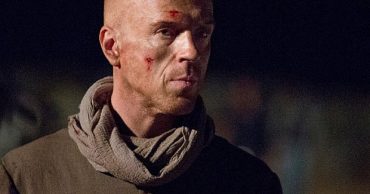
Following the horrible explosion in New York City, which resulted in Saiku’s death in last week’s episode of Homeland, I expected the series to thoroughly deal with the fallout of the incident in tonight’s all-new hour. However, I would have never expected to see these consequences unfold in the way that they do in “Casus Belli,” which is easily the most tense and exciting episode we’ve seen in Homeland Season 6, and it’s also an installment that somewhat blends the new, more pulpy version of the show with the smaller, more intimate version of it from its first two seasons.
Of course, much of the tension and action in “Casus Belli” comes from Quinn’s actions, as his suspicions and his desire to protect Frannie cause him to take incredibly extreme measures when guarding Carrie’s house from reporters and angry protesters. At first, Quinn waves off the groups of people that come banging on the front door, asking for any comment from Carrie about the attack that killed two people and wounded six; since they know that she was a part of Saiku’s defense team, they want to hear what she has to say. But Quinn doesn’t see these reporters as people that are just doing their jobs; due to his paranoia and PTSD, but also his very real and understandable suspicions (which Carrie begins to understand in the episode’s final moments), he believes that the media has been sent to Carrie’s house as part of some mission to spy on them, which is why he drags one reporter inside and chokes her before pushing her out of the house and down the stairs, and also why he fires his gun and shoots a protester who throws a rock through Carrie’s window.
After the protester is shot, the situation at Carrie’s house quickly escalates, to the point that almost everything else in the episode, from Keane being silenced to Saul and Dar’s conversation about Iran and whether Farhad’s interrogation was only a charade, seems meaningless, and if there’s one major complaint to lodge against “Casus Belli,” it’s that the episode is so focused on Quinn’s story that it forgets to pay attention to Homeland‘s other characters. Even Carrie’s actions in response to the news about Saiku feel a little overshadowed by everything happening with Quinn. The reveal that her NSA contact isn’t the one that gave her the recording between Conlin and his informant should be a major moment, a turning point that pushes Season 6 in a new direction and even suggests that we could be seeing an unhappy alliance between Carrie and the FBI agent that can’t stand her. However, as Quinn continues to get himself into more and more trouble by first not allowing Latisha and Frannie to leave and then by taking a police officer hostage, everything else in “Casus Belli” begins to fade away.
It’s with Quinn’s storyline where we see the Homeland of recent years, the series that’s more bombastic and action-packed than it was in its earlier days. That’s not necessarily a bad thing; some of Homeland‘s most action-focused episodes are also the show’s best. But by becoming more like a premium cable version of 24, Homleand has lost some of the intimacy and sophistication that made it so special when it debuted back in 2011. The stakes have become much higher, sure, but that chess-match tension that we got from the Carrie/Brody storylines in Season 1 and 2 has disappeared with these larger, more worldwide threats.
However, in the closing moments of “Casus Belli,” there’s a hint that Homeland might be returning to its smaller-scale roots, as Carrie looks at the photos on Quinn’s phone, recognizing the company that Saiku worked for in the images. She goes to her window and looks across the street at the person that’s watching her; he tries to remain completely hidden, but she can see him and so can we. It’s in this scene that Homeland harkens back to the early Season 1 episodes in which Carrie would pour over footage of Brody, analyzing the movement of his fingers in an attempt to acquire some type of evidence that proved he was a terrorist. With the obvious setting up Saiku and Carrie and Quinn more than likely finding themselves under surveillance, the stakes in Season 6 feel a little less high but so much more personal, and for a Homeland like myself, that is very, very good news.
Other thoughts:
- So far, Homeland has done a pretty terrific job at illustrating how debilitating and harmful Quinn’s PTSD can be, while also acknowledging that some of his suspicions, particularly the ones about the man across the street, have merit. In this week’s episode, the show falters a little bit, wanting us to be both excited by the action taking place but also fearful and sad for what Quinn is putting Frannie and Latisha through. It’s a tricky balancing act to pull off, and Homeland, for the most part, has done a solid job with it.
- Speaking of Frannie, she might be the calmest kid I’ve ever seen. How did she not cry once throughout that entire ordeal?
- I wonder if we’ll ever encounter that talk show host again, or if he was just used in this episode to make Keane feel even more isolated as she watches the TV alone without any of her staff members there to assist her.
- And who do we think was behind putting Keane by herself? Was this all Dar Adal’s doing, or is someone with even more influence going up against the President-elect?
- It’s a small moment, but the scene in which Carrie tells Quinn that seeing him and Frannie together made her feel the best she’s felt in a very long time is probably my favorite from this week’s episode. Sweet, honest, and heartbreaking.
- Here’s hoping that the final scene of this episode is an indication that Carrie and Quinn will be working together to take down whomever is behind the bomb setup. Although, who knows when Quinn will be a free man. He did shoot someone and hold a cop hostage, and PTSD or no PTSD, that’s a lot to forgive.
What did everyone else think about this week’s episode of Homeland? Comment below and let me know.
[Photo credit: JoJo Whilden/Showtime]
 Follow Us
Follow Us





